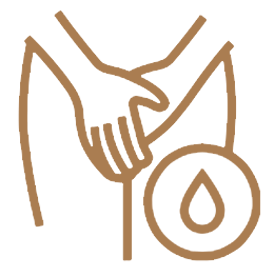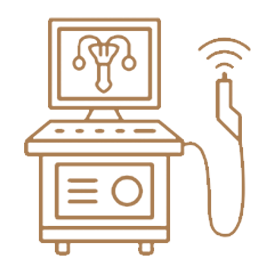Women's Health
Stress Urinary Incontinence (SUI) Treatment
Stress urinary incontinence (SUI) occurs when urine leaks involuntarily during activities that increase pressure on the bladder.
Common triggers include coughing, sneezing, laughing, jumping, or lifting heavy objects.
Although very common among women, SUI can be emotionally distressing and may affect daily life, exercise, and social confidence.
Understanding the underlying cause is the first step toward effective treatment.
What Causes Stress Urinary Incontinence?
1. Post-Childbirth Changes
Vaginal delivery can stretch, weaken, or injure the pelvic floor muscles and connective tissues.
When the pelvic floor cannot support the bladder and urethra effectively, leakage may occur during physical activity.
2. Aging
As women age, muscle strength naturally declines — including the pelvic floor muscles.
This reduction in support can lead to involuntary leakage.
3. Post-Menopause Estrogen Decline
Lower estrogen levels affect the elasticity and strength of pelvic tissues.
This can reduce urethral support and increase the likelihood of SUI.
4. Obesity
Excess body weight increases abdominal pressure on the bladder and pelvic floor, causing leakage during activities that strain the area.
5. Chronic Coughing
Conditions such as asthma, smoking-related cough, or allergies can place repeated stress on the pelvic floor.
Over time, this increases the risk of stress incontinence.
Can Stress Urinary Incontinence Be Improved?
Yes. Modern non-surgical treatments can effectively strengthen pelvic floor muscles, improve bladder support, and reduce or eliminate leakage episodes.
Early intervention often leads to better long-term outcomes.
Treatments for Stress Urinary Incontinence
1. Medlander RevivaPelvic Care
A medical pelvic rehabilitation system designed to:
strengthen pelvic floor muscles
improve bladder and urethral support
enhance muscle endurance and control
This treatment is gentle, non-invasive, and suitable for postpartum women, menopausal women, and individuals with mild to moderate SUI.
2. EmFemme 360 (Radiofrequency Pelvic Rejuvenation)
Uses controlled radiofrequency energy to:
tighten pelvic floor tissues
restore vaginal and pelvic support
improve moisture and comfort
reduce urinary leakage
This treatment is comfortable, fast, and requires no downtime.
FAQ
1. Is SUI treatable without surgery?
Yes. Many patients experience significant improvement with non-invasive pelvic floor strengthening technologies.
2. Who is suitable for treatment?
Women who have recently given birth, are post-menopausal, or experience leakage when laughing, coughing, or exercising.
3. Is the treatment painful?
Both treatments are gentle and comfortable, with no downtime.
4. How many sessions do I need?
Most patients see improvement after several sessions, depending on severity.
Intimate Care
Intimate health is an important part of a woman’s overall confidence and quality of life.
Certain stages of life — from childbirth to menopause — can lead to changes in vaginal comfort, elasticity, and moisture levels.
These changes are natural, but they can affect daily comfort, sexual satisfaction, and overall well-being.
Specialized medical treatments can help restore intimate health gently and effectively.
What Causes Intimate Discomfort or Changes?
1. Post-Childbirth Changes
During childbirth, the vaginal canal stretches significantly to allow the baby to pass through.
This can lead to:
weakened or stretched vaginal muscles
reduced tightness
changes in sensation
decreased sexual satisfaction
These changes vary by individual and may persist even after recovery.
2. Menopause and Hormonal Decline
As estrogen levels decrease during menopause, the vaginal tissues become:
thinner
drier
less elastic
This can cause discomfort, pain during intercourse, and reduced lubrication, affecting both intimacy and daily comfort.
3. Natural Aging
With age, reduced collagen and elastin production can affect vaginal tone and hydration.
4. Lifestyle Factors
Stress, childbirth history, hormonal shifts, and certain medical conditions may further contribute to dryness or reduced muscle tone.
Can Intimate Health Be Improved?
Yes. Modern non-surgical treatments can safely and effectively improve:
vaginal tightness
hydration and moisture levels
elasticity
sexual comfort
overall intimate well-being
All treatments are handled by trained medical professionals in a private and safe environment.
Treatments for Intimate Care
1. EmFemme 360 (RF Vaginal Rejuvenation)
A comfortable, non-invasive radiofrequency treatment designed to:
tighten vaginal tissues
improve elasticity
enhance lubrication
restore intimate comfort
Suitable for postpartum women and women experiencing menopausal changes.
2. VHyal Gel (Intimate Hyaluronic Acid Hydration)
Improves:
vaginal dryness
discomfort during intimacy
reduced moisture levels
Provides deep hydration and strengthens tissue health.
3. PRP / PRF (Regenerative Intimate Therapy)
Uses your body’s own growth factors to:
improve tissue healing
enhance lubrication
increase sensitivity
promote healthier intimate tissues
A natural, regenerative option for women seeking gentle improvement.
4. Polynucleotide NewGyn
A regenerative treatment that:
stimulates collagen production
repairs delicate tissues
improves elasticity and hydration
supports overall vaginal rejuvenation
Ideal for women experiencing dryness, laxity, or postpartum changes.
FAQ
1. Is intimate rejuvenation painful?
Most treatments are comfortable, with little to no downtime.
2. Who is suitable for treatment?
Women who experience dryness, laxity, discomfort during intimacy, or postpartum changes.
3. How soon can I see results?
Some patients feel improvement after a few sessions, with optimal results developing gradually.
4. Is it safe?
Yes. Treatments are medical-grade, non-surgical, and performed by trained professionals.
Post Partum Recovery
Pregnancy is a unique and beautiful journey, bringing joy and anticipation as a new life grows.
However, it also brings significant physical changes that may continue long after delivery.
Postpartum recovery focuses on helping women heal, rebuild strength, and regain confidence after childbirth.
With proper rehabilitation and medical support, many postpartum concerns can be improved safely and effectively.
Common Postpartum Concerns
1. Diastasis Recti (Abdominal Muscle Separation)
During pregnancy, the abdominal muscles naturally stretch to make room for the growing baby.
In some women, this stretch becomes a separation along the midline, known as diastasis recti.
It may cause:
a protruding abdomen (“postpartum belly”)
core weakness
lower back discomfort
reduced physical stability
Strengthening and proper therapy can help restore core function.
2. Stretch Marks
Stretch marks occur when skin stretches rapidly and the underlying elastic fibers tear.
Common areas include:
abdomen
breasts
buttocks
thighs
While harmless, stretch marks may affect appearance and self-confidence.
Medical treatments can help improve texture, color, and overall skin quality.
3. Stress Urinary Incontinence (SUI)
SUI is the involuntary leakage of urine during activities that put pressure on the bladder, such as:
coughing
sneezing
lifting
exercise
It is common after childbirth due to weakened pelvic floor muscles and connective tissues.
Postpartum rehabilitation aims to restore pelvic strength and improve bladder control.
Treatments for Postpartum Recovery
1. Medlander RevivaPelvic Care
A non-invasive pelvic floor rehabilitation system designed to:
strengthen pelvic floor muscles
improve bladder control
support postpartum healing
Suitable for postpartum women experiencing pelvic floor weakness or urinary leakage.
2. EmFemme 360 (RF Intimate Rejuvenation)
Uses radiofrequency to gently:
tighten vaginal tissues
enhance elasticity
improve comfort and moisture
support postpartum recovery
A comfortable, non-surgical option with no downtime.
3. Diastasis AbRevive (Core Rehabilitation Technology)
Targets abdominal separation by:
improving muscle strength
supporting core realignment
reducing abdominal bulging
Helps restore stability and functional strength after pregnancy.
4. Radiofrequency Microneedling for Stretch Marks
Stimulates deep collagen regeneration to:
tighten stretched skin
improve texture and color
reduce the appearance of stretch marks
Effective for early and late-stage postpartum stretch marks.
FAQ
1. When can I start postpartum treatments?
Many non-invasive treatments can begin as early as 6–8 weeks postpartum, depending on individual recovery and doctor assessment.
2. Is postpartum recovery the same for everyone?
No. Each woman’s body heals differently. A personalized plan ensures safe and effective treatment.
3. Are these treatments painful?
Most treatments are comfortable, with minimal to no downtime.
4. Can this help even years after childbirth?
Yes. Many postpartum issues—including diastasis recti, stretch marks, and SUI—can still be improved long after delivery.



